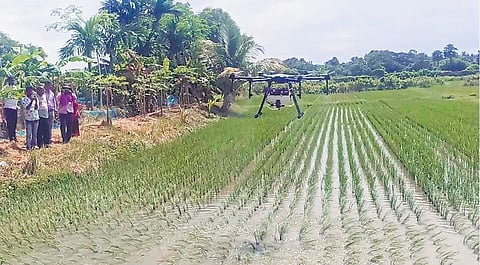

JAGATSINGHPUR: Farmers of Jagatsinghpur are getting trained on using drones for spraying Bispyribac Sodium on their land to control various types of weeds, including grassy and broadleaf varieties.
Krishi Vigyan Kendra (KVK) conducted a drone demonstration programme at its Tirtol centre recently where around 50 farmers were explained the use of drones in agricultural activities. Experts from the Agriculture department explained how drone technology, equipped with Artificial Intelligence (AI), Machine Learning (ML), and remote sensing features, is gaining popularity due to its distinct advantages. The system enables drones to deploy pods, seeds, and crucial nutrients directly into the soil.
During the demonstration, a drone was used to spray Bispyribac Sodium, a widely used post-emergence, broad-spectrum herbicide on land. The herbicide is effective in controlling various weeds and plays a crucial role in the agricultural industry. It selectively targets weeds, inhibits the synthesis of essential amino acids and eventually leads to their stunted growth and death. Its high efficiency, selectivity and low toxicity make it a valuable tool for farmers.
Farmers raised several questions regarding the use of drones, including concerns on cost, weather dependence, operational complexity, regulatory compliance, potential impact on crops, data interpretation, and privacy. Experts emphasised that drone technology offers a range of benefits, such as increased efficiency, improved yields, and reduced costs. However, local farmers expressed concerns over potential job losses, as fewer labourers would be needed for manual work on farms. They also highlighted challenges related to knowledge gaps, lack of training, and financial constraints, particularly for small-scale farmers.
Experts noted that drones have been used in agriculture for various applications, including water management, plant health assessments, soil analysis, and field mapping. However, their current primary use is for pesticide spraying. Farmers in the district suggested expanding the use of drones for spraying water-soluble fertilizers and pesticides, as this technology can help increase production, prevent environmental degradation, and enable more effective crop health monitoring.
The event was attended by OUAT chief scientist Rabi Ratan Das, Krishi Vigyan Kendra scientist Dwarika Mohan Das, and other agriculture experts.